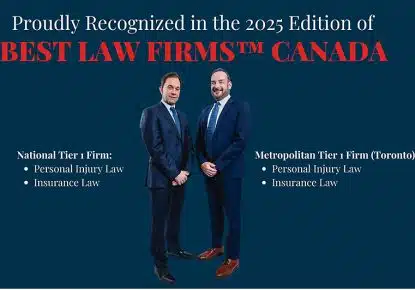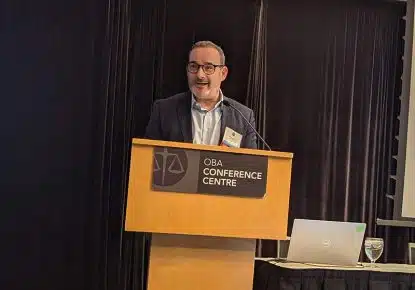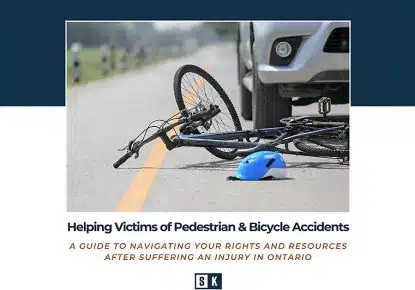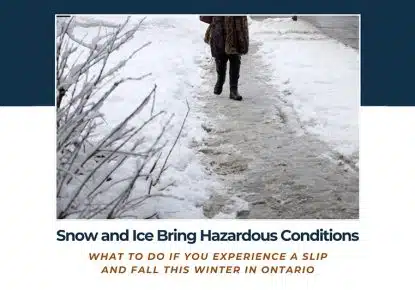
Surveillance of accident victims should not compromise their recovery
Surveillance is a powerful tool, and advancements in technology have opened up many new and inventive ways for people to be monitored, tracked and observed. While it may seem intrusive, our personal injury lawyers at Singer Katz know that the surveillance of accident victims during a claim is a common practice and can sometimes be turned to our clients’ advantage.
How is surveillance used in a personal injury claim?
Insurance companies and defendants in personal injury and disability claims will often conduct surveillance or other investigations of an injured plaintiff in an attempt to verify or undermine their credibility. Its purpose is to determine whether the victim is being truthful and accurate in their reported disability and level of function.
In these cases, the goal is to cast doubt on the plaintiff’s credibility by presenting evidence of them performing activities that are inconsistent with their injuries. Such evidence may impact the amount of compensation the Plaintiff receives or their ability to receive any at all.
Unfortunately, the fear of “being followed” or having a claim denied can pressure victims into staying at home and avoiding social activities or hobbies they would normally participate in. This fear is an additional burden on accident victims, who should be focused on their road to recovery.
What types of surveillance can an insurance company perform?
There are two main categories of surveillance used to detect by insurers in a personal injury claim.
1 – Direct surveillance
An insurance company can provide the claimant’s name or address to a private investigator who will proceed to photograph or videotape their day-to-day activities to obtain evidence of their reported injuries.
These activities may include:
-
Travelling to and from work
-
Picking up children from school
-
Participating in social events
-
Performing household chores
In particular, a private investigator might document evidence to answer questions such as:
-
How often does the claimant leave their home?
-
Do they have any difficulties with movement?
-
Do they use an assistive device?
-
Are they able to drive and how long for?
-
How long are they able to walk?
-
What are they able to lift or carry?
2 – Digital surveillance
Social media is a common way for private investigators to monitor accident victims using the publicly available information on their profiles. This may include photos, videos or written statements of the victim participating in activities or expressing sentiments that appear inconsistent with their personal injury claim.
In addition, an investigator can perform data surveillance by running checks on a claimant’s driver’s license, searching court databases or simply entering the claimant’s name in a search engine to see what comes up in what context.
It is important to note that surveillance can rarely show the full extent of a claimant’s injuries. Particularly for those with invisible disabilities, such as chronic pain or post-traumatic stress, a photograph may only capture the claimant on one of their “good days” where they are operating at a higher capacity than usual. For example, a motor vehicle accident victim may report difficulty driving due to increased anxiety, but a photograph of the victim in the driver’s seat of their car could be used to contradict their statement.
Are there limits to the surveillance that insurance companies can perform?
While an insurance company has the right to perform surveillance, private organizations can only follow claimants in public areas and can only obtain publicly available information. For example, an investigator is allowed to photograph a claimant at a public park or outside their residence, but they cannot look into the window of their home or trespass on their property.
Similar standards apply to digital surveillance. Private investigators cannot perform data searches beyond what is publicly available or accessible through common services and facilities (e.g., a driver’s license search). Many insurers will request access to Facebook or other social media accounts and request that the victim does not alter or delete potential evidence.
The Information and Privacy Commissioner in Ontario has also prepared Guidelines for the Use of Video Surveillance about the rules for the collection, use and disclosure of personal information by institutions in greater detail.
What should a personal injury victim do if they believe they are under surveillance?
The main way surveillance can negatively affect a personal injury claim is when the evidence shows the claimant participating in an activity they reportedly cannot do. As such, claimants should continue with all the activities they are physically and mentally able to perform and abstain from any activities that they have been medically advised to avoid. Claimants should also proceed with any rehabilitation activities that they have been medically advised to do.
When filing a personal injury claim, it is important that the victim understands that anything they do in public or post online is available for the defense to discredit their claim. For example, a photograph of the claimant gardening in their front yard, a place where a member of the public could legally survey them, may undermine their reported injuries by suggesting that they are able to do manual labour.
Even if the claimant abstains from posting on social media during the claims process, a photograph of them could appear online on someone else’s profile. As such, the key is to be honest and consistent with limitations when reporting to health providers and examinations.
Insurance companies are required to disclose evidence obtained through surveillance. A careful review of this evidence can at times support a victim’s claims where the activities are consistent with the level of function reported.
For those with reason to believe they are being surveyed, consult with the personal injury lawyers at Singer Katz who are available to not only help protect your privacy, but also uphold your credibility during the claims process.








